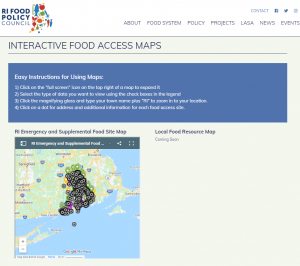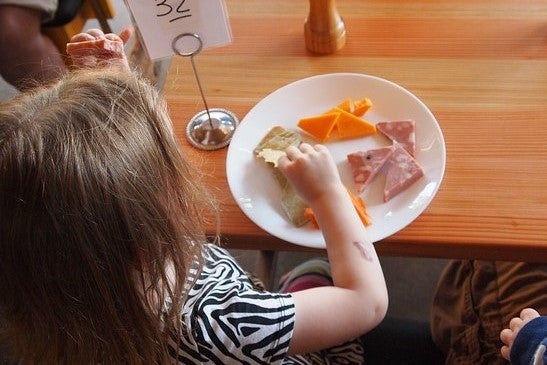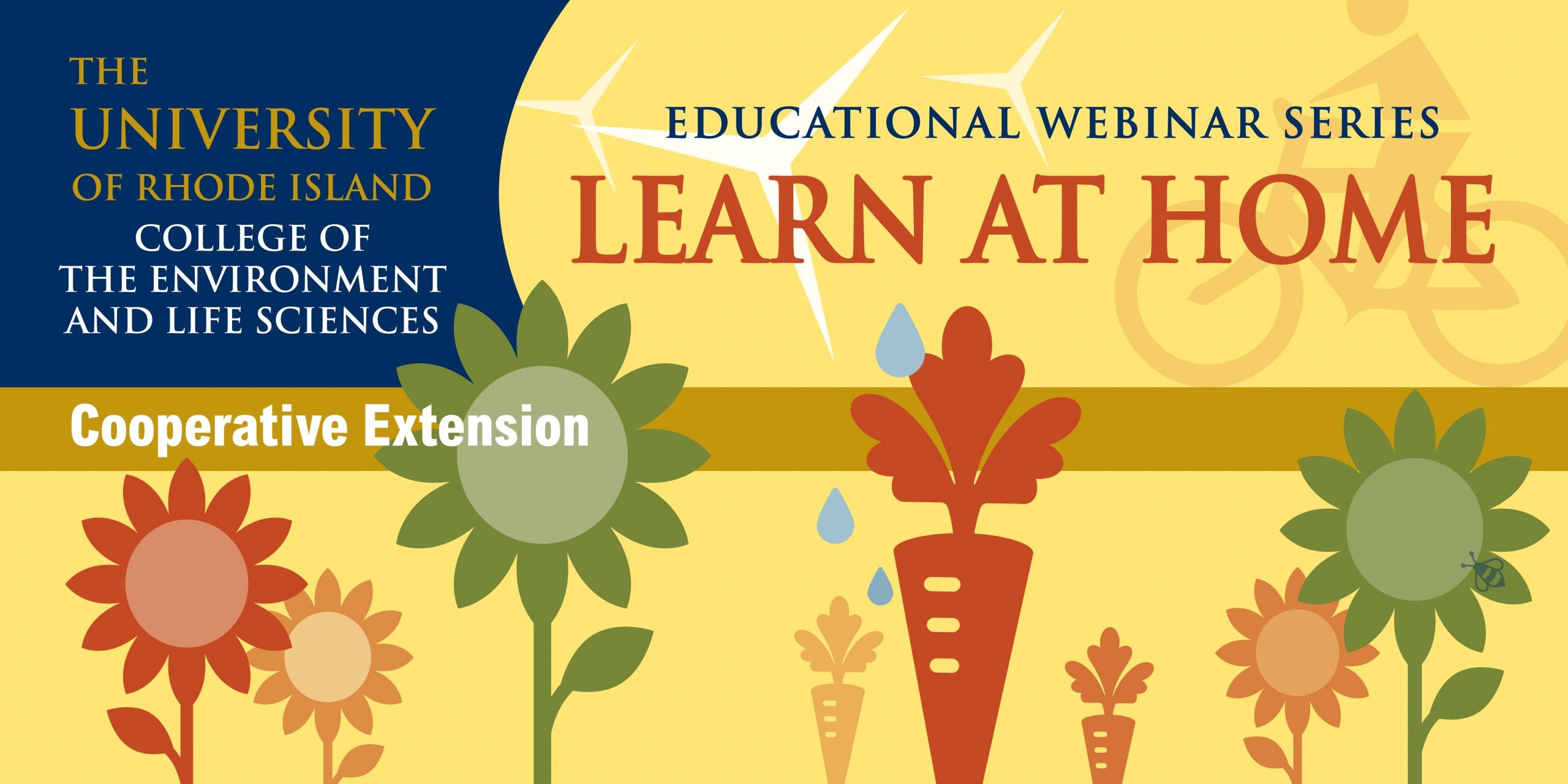COVID-19 RESOURCES
The worldwide pandemic involving COVID-19 (coronavirus) has produced unprecedented challenges in the URI community and around the world. URI Cooperative Extension has curated the science-based resources below in an attempt to support our stakeholders during this difficult time. As new resources are identified, they will be added to the appropriate section below — please check back for more information!
General COVID-19 Resources
-
For the latest RI-relevant updates, please visit the RI Department of Health’s COVID-19 Information page and the RI Food Safety Task Force
-
For health information, please visit the Centers for Disease Control and Prevention website.
-
Latest COVID-19 Information From the Food and Drug Administration
-
For more information from the University of Rhode Island, visit the URI COVID-19 update page.
RI-Specific Resources
Virtual Educational Content:
We are pleased to announce our Learn at Home Webinar Series featuring a free hour-long webinar every Tuesday at 7:00 p.m. and Friday at noon. Please visit our Facebook page or CoopExt Events page to view a list of upcoming webinars.
Questions/Concerns:
If you have questions about scheduled URI Cooperative Extension programs and events during this uncertain time, or if you seek science-based information about an issue that is important to you, please fill out the form below and a URI Cooperative Extension staff member will contact you within 2 business days.
-
Questions / Concerns Form
On behalf of the entire URI Cooperative Extension team, we look forward to serving you soon. In the meantime, we are available to assist you remotely. Please see our directory for faculty and staff contact information.
Feeding Your Family
Food Safety and COVID-19
Crisis Support for Families with Children
4-H Youth Education Resources
Maintaining Family Nutrition
Mental Health and Wellbeing
Water, Land and Energy-related COVID-19 Information
Resources for Faculty and Staff
Social Justice Resources
Feeding Your Family
Schedule a home delivery of local, farm fresh goods:
Buy from a local farm store, a farmer’s market, and/or a grocer or retailer who sells RI goods:
- Guide to local farms and farmers markets (Farm Fresh RI)
- How to Support Farmers and Safely Shop at Farmers Markets (Civil Eats)
Support local food businesses and restaurants:
- RI Restaurants with online ordering and takeout (EatDrinkRI)
- A guide on supporting local restaurants and food-related businesses through online ordering (Edible Rhody, 3/20/20)
Plant a Resilience / Victory Garden:
- What you need: Seeds, water, soil, containers or a garden bed, full sun, time and information. Don’t know where to start? The RI Planting Calendar will help you determine what seeds can be sown directly in the soil outdoors, and when (versus others that require indoor seed starting under grow lights).
- URI Gardening & Environmental Hotline:

- Stay tuned for more RI-relevant science-based growing tips!
Access Food Assistance Programs:
- Map of Emergency and Supplemental Food Sites in RI

- Supplemental Nutrition Assistance Program: As of 3/27/20, the federal government is allowing states to give all SNAP households the maximum SNAP benefit for their household size for April. The amount of SNAP benefits a household receives is based on a federal formula that takes into account the number of people in the household and its income and expenses. If a household’s usual benefit amount is below the maximum amount, they will receive additional benefits to bring them to the maximum amount listed for their household size. See benefits chart and guidance here.
- United Way 211: Provides support for RI families for assistance with basic needs, including food, childcare, and housing. Chat with them online, call 800-543-7709, or text your zip code to 898-211 to talk.
- Local Food Pantries: The Rhode Island Community Food Bank continues to deliver food through their statewide network of member agencies. At the member agencies of the RICFB, all are welcome – Todos Son Bienvenidos – regardless of background, including immigration status.
Senior Support:
- RI Office of Healthy Aging: Local Resources (includes food & supplies resources)
- RI Special Grocery Store Hours
- East Bay Senior Dining Program: Boxed Lunches
Food Safety and COVID-19
Consumers:
- Is Coronavirus a Food Safety Issue? (NCSU)
- Food Safety Recommendations & Frequently Asked Questions for the Consumer (Cornell University)
- Is Coronavirus a Concern with Takeout? (NCSU)
- Is Coronavirus a Concern at Grocery Stores? (NCSU)
- Seafood Safety Frequently Asked Questions (National Fisheries Institute)
- Cleaning and Disinfecting (NCSU)
- The Safe and Proper use of Disinfectants and Household Cleaners in the Indoor Environment: A free webinar.
- Hand Hygiene (NCSU)
- Homemade Hand Sanitizer (NCSU)
- Food Safety in Community Gardens (NSCU)
- Facemasks and Cloth Face Coverings (NCSU)
- Do-It-Yourself Cloth Face Coverings (NCSU)
- Bandanas as Cloth Face Coverings (NCSU)
- How to Use Cloth Face Coverings (NCSU)
- Washing Produce (NCSU)
- Could Eating Fresh Produce Cause COVID-19? (NCSU)
- Fresh Produce Top Tips (NCSU)
- Social Distancing at the Farmers’ Market (NCSU)
- Es el Coronavirus un Problema de Seguridad en los Alimentos? (NCSU)
- Me Debo Preocupar del Coronavirus y la Comida Para Llevar? (NCSU)
- Me Debo Preocupar del Coronavirus Cuanda Voy al Supermercado? (NCSU)
- Limpiando y Disinfectando (NCSU)
- Lavese Las Manos Frecuentemente (NCSU)
- Desinfectante de Manos Hecho en Casa (NCSU)
Food Processors and Retail Stores:
- Food and Drug Administration Guidance for Industry
- COVID-19 Food Industry Resources and FAQ’s (Cornell University)
- Public Health Emergency Response for Retail Store Managers (Louisiana State University)
- Retail Food Environments (NSCU)
- Cloth Face Coverings for Food Employees (NCSU)
- Protecting Seafood Processing Workers from COVID-19 (CDC)
Farmers and Farmers Markets:
- COVID-19 Resources for Farmers (RIDEM)
- Farmer’s Market and On-Farm Market Guidance (RIDEM)
- Farms and On-Farm Deliveries Guidance (RIDEM)
- Farmer’s Guide to COVID-19 Relief (Farmers’ Legal Action Group)
- Considerations for Fruit and Vegetable Growers Related to Coronavirus & COVID-19 (University of Vermont)
- Comprehensive RI Food-related COVID-19 Resources list (RI Food Policy Council)
- Cleaning vs Sanitizing (Cornell University)
- List of Approved Sanitizers (U.S. EPA)
- Agricultural operations in RI as it relates to non-essential retail business (RI Farm Bureau)
- COVID-19 Economic Injury Disaster Loan Application for Small Businesses
Crisis Support for Families with Children
Kids’ Link RI
Kids’ Link RI™ is a hotline for children in emotional crises. A program offered in collaboration with Gateway Healthcare, Lifespan, Hasbro Children’s Hospital and Bradley Hospital, Kids’ Link RI is available 24 hours a day, seven days a week for children suffering from behavioral problems or psychiatric illness. Call 1-855-543-5465.

Food Sites for Children
Due to the closure of schools, free “Grab and Go” meals are available for children throughout Rhode Island. At the vast majority of these sites, anyone aged 18 or under who shows up gets a free meal. Some food sites are only providing meals to students who are enrolled in that school/district. These sites have a note under the Time section indicating any restrictions. Whether a site is serving all students or just that school’s students, the child must be present; schools cannot give a meal to an adult on behalf of a child.

Providence Public Schools Grab and Go Meal Program
As of Tuesday, April 7, Providence Public Schools will move to a twice weekly free meal distribution for children ages 18 and younger. Distribution will take place on Tuesdays and Fridays, 11 a.m. to 2 p.m. at 14 sites throughout the city. This program is offered in coordination with Sodexo Food Services and will continue as long as distance learning is in place.
4-H Youth Education Resources
Inspire Kids to Do
4-H empowers kids to grow into True Leaders through inspirational, hands-on learning experiences. Explore this page to receive hands-on, educational activity ideas for kids and teens, including our latest 4-H activity guides to help inspire even more young people to do, learn, and grow.
Distance Learning Socials
University of Vermont Extension hosts virtual meet-ups for youth in science, civic engagement and healthy living every Monday at 3 p.m. Upcoming topics include Birding 101, Community Care, Making Maps and more! Registration required.
Learn at Home: Educational Resources to Use During School Closures
University of Maine Cooperative Extension has assembled this collection of helpful educational resources for parents and caregivers. From science to financial literacy, whether for toddlers or teenagers, we encourage you to take advantage of these activity books, guides, and other resources to help children remain engaged in educational experiences throughout their school closure.
Build a Windmill and Lift an Object!
This hands-on activity from the 4-H STEM lab introduces youth (pre-K – grade 2) to mechanical engineering and wind power through this activity that guides kids through building a simple windmill that powers a pulley system!
4-H Grab & Go Wind Energy Curriculum
The Power of Wind from 4-H features nine ‘Grab & Go’ activities for youth grades 6-8. The activities teach youth to design, build and create wind powered devices and explore wind as a potential energy source in your community.
Perfect Stay-at-Home Projects
Enjoy a dozen free PDF’s of books (20-30 pages) of hands-on fun in sewing, cooking and nature from Ohio State University Extension. Easy to use lessons, and fun!
Fun Hands-on Learning to do at Home
The University of Wisconsin-Madison Extension has 4-H youth project book PDF’s for knitting and making masks, STEM and arts activities, Scratch Jr. Coding, and science experiments for teens to do on their cell phones!
Wildlife and Water Curriculum
University of Idaho’s comprehensive curriculum offers activities for learning about the natural environment.
Mental Health and Wellbeing
- URI Community First Responder Program: Do you live in a rural Rhode Island community? Do you want to make a difference in the current opioid crisis? Now more than ever, with so many people at home cut off from the support they typically receive, it’s crucial we have people who understand how to respond to an opioid overdose in the crucial seconds that make difference between life and death. Become a Community First Responder! It only takes an hour!
- Finding Answers Now: Iowa State University’s Human Sciences Department has a myriad of resources for families including: “How to Help Children Cope with the Corona Virus Response” and “Helping Children Cope when the New is Scary”.
- The Science of Parenting: Iowa State University’s website featuring resources like “Parenting in Challenging Moments” and “Tools for Living and Working in the Same Place”.
- The Learning Child: The University of Nebraska Extension clearinghouse for information on helping children cope in early childhood during disasters. Includes a virtual space for children of all ages and parents.
Maintaining Family Nutrition
- Tips for Stocking and Eating Fresh Fruits and Vegetables (Center for Vulnerable Populations, San Francisco General Hospital)
- Stocking a Healthy Pantry and Fridge
- Eating Healthy for Diabetes
- Eating Healthy for High Blood Pressure
Water, Land and Energy-related COVID-19 Information
- U.S Energy Information Administration Energy Kids information & activities: The Energy Kids website provides a host of information including energy basics, energy calculators to help youth understand the types and scale of energy used around the world. The site also includes games, activities and quizzes to test your energy IQ!
- National Energy Education Development (NEED) Distance Learning Resources: NEED has compiled resources for teachers, families and students to continue their energy education at home! The offerings include links to games and activities easily completed at home with minimal supervision. All NEED curriculum is organized by grade and available for free on the NEED website.
- Thinking about upgrading your home? Take energy efficiency into consideration. You can save money and energy by upgrading your home for energy efficiency. Its important to think about how all the parts of your house work together as a system. Cornell Extension provides tips on things to consider for a home upgrade and how to get started
- Take advantage of free home energy assessments and rebates from National Grid. National Grid provides free energy assessments and access to low cost upgrades to help you reduce your energy bills. Find more information on how to schedule a free assessment and other incentive programs.
Resources for Faculty and Staff
Social Justice Resources
compiled by Nia Imani Fields, University of Maryland
URI Cooperative Extension strives to fight for equal distribution of resources and opportunities to ensure equitable access to science among all cultures and backgrounds, regardless of race, color or socioeconomic status. Food, environmental and energy justice is social and racial justice, and that is part of what underlies our work in extension. We will continue to work for change and cultivate an environment that upholds the values of equity and inclusion. As an organization seeking to serve diverse cultures and populations, we are committed to increasing our own cultural awareness and learning how to be a stronger ally and actively be anti-racist. We stand with the nation in working towards combating racial injustice. Black lives matter. We stand with the black community, because we are stronger together. For a curated list of social justice resources, please visit uri.edu/coopext.
Racial Equity Resources for Youth
Diversity, Equity, Inclusion & Social Justice Resources
- Definitions
- Teaching Tolerance
- PLWG Access, Equity and Belonging for All
- eXtension Diversity, Equity and Inclusion
- Racial Equity Tools
- Michigan State University Extension
- Everyday Democracy Police Relations
Professional Development
- 4-H Social Justice Guide for Youth Development Professionals
- Increasing Cultural Awareness & Equity in Extension Programs
Implicit Bias Tools
4-H Diversity Curriculum & Activities
Suggested Readings
- Bennett, M. J. (1986). A developmental approach to training for intercultural sensitivity. International Journal of Intercultural Relations, 10(2), 179–196.
- DiAngelo, Robin J. (2018) White fragility: Why it’s so hard for white people to talk about racism. Boston: Beacon Press.
- Fields, N. & Nathaniel, K. (2015a). Our role in and responsibility toward social justice. Journal of Extension, 53(5), 5COM2. Freire, P. (1970/2012). Pedagogy of the oppressed. New York: Bloomsbury Academic.
- Gay, G. (2010). Culturally responsive teaching: Theory, research and practice (2nd edition). New York: Teachers College Press.
- Ginwright, S. & Cammarota, J. (2002). New terrain in youth development: The promise of a social justice approach. Social justice, 29(4), 82-95.
- Jean-Marie, G., Normore, A. & Brooks, J. (2013). Leadership for social justice: Preparing 21st century school leaders for a new social order. Journal of Research on Leadership Education, 4(1), 1-31.
- Ladson-Billings, G. (1995). But that’s just good teaching! The case for culturally relevant pedagogy. Theory into Practice (34)3, 160-165.
- Sadd, L. (2020). Me and white supremacy: Combat racism, change the world and become a good ancestor.
- Sensoy, O. and DiAngelo, R. (2012). Is everyone really equal? New York: Teachers College Press. Illinois: Sourcebooks


